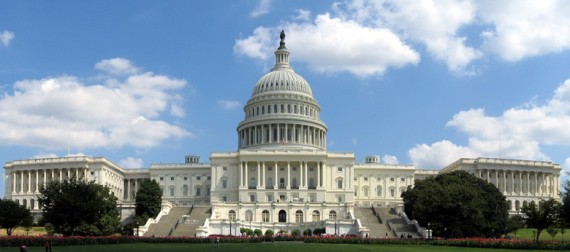Odd Congressional Priorities: Our National Motto
For some reason, the House Of Representatives decided that it was important to take time yesterday to debate this issue:
The House took a break from battles over economic policy Tuesday and returned to the culture war.
With overwhelming bipartisan support, the Republican-led chamber voted to reaffirm “In God We Trust” as the official U.S. motto and encourage its display in all public schools and buildings.
The nonbinding resolution inevitably reopened a debate over separation of church and state — the sort of social issue that has taken a back seat this year to the debt ceiling, budget deficit and flagging economy.
Introduced by Rep. Randy J. Forbes (R-Va.), it passed 396 to 9. “Whereas if religion and morality are taken out of the marketplace of ideas, the very freedom on which the United States was founded cannot be secured,” it reads.
Christian conservatives praised the effort, but critics saw it as an attempt to gin up support from the GOP base.
“I think we know by now that this Congress likes God. Can we move on?” said the Rev. Barry Lynn, executive director of Americans United for Separation of Church and State.
I suppose the real question is does God like Congress?


Look! Bipartisan concensus!
Did the clouds part and angels sing?
Gag me.
Geeze, Doug, it’s not “congressional priorities.” It’s REPUBLICAN priorities.
Yes, almost all the Ds fell in line and voted yes — who wouldn’t.
It was Republicans who created this bill, who insisted it be the issue of the day, who wasted all this time on it.
The same Republicans who say we need to focus on jobs and then spend their time passing anti-abortion bills.
I realize that “In God We Trust” is not nearly as great a statement of religious fervor as “both sides are equally to blame,” but this is entirely a Republican affair.
Ah, good ol’ Randy Forbes…
I consider the fact that DC hasn’t been burned since the War of 1812 to be highly supportive of the position that there is, in fact, no God at all. Therefore, your motto is irrelevant.
In God We Trust…
All others must pay cash.
I don’t trust God in the slightest — I’ve read the Bible and that guy seems to have serious anger issues.
So, so dumb and typical of the GOP these days.
Well, it’s pretty obvious he hates us.
Apart from the waste of Congress’s time, the government’s inscription of the phrase “In God we trust” on coins and currency, as well as its addition of the words “under God” to the pledge of allegiance in 1954 and adoption of the phrase “In God we trust” as a national motto in 1956, were mistakes, which should be corrected. Under our Constitution, the government has no business proclaiming that “we trust” “In God.” Some of us do, and some of us don’t; each of us enjoys the freedom to make that choice; the government does not and should not purport to speak for us in this regard. Nor does the government have any business calling on its citizens to voice affirmation of a god in any circumstances, let alone in the very pledge the government prescribes for affirming allegiance to the country. The unnecessary insertion of an affirmation of a god in the pledge puts atheists and other nonbelievers in a Catch 22: Either recite the pledge with rank hypocrisy or accept exclusion from one of the basic rituals of citizenship enjoyed by all other citizens. The government has no business forcing citizens to this choice on religious grounds, and it certainly has no business assembling citizens’ children in public schools and prescribing their recitation of the pledge–affirmation of a god and all–as a daily routine.